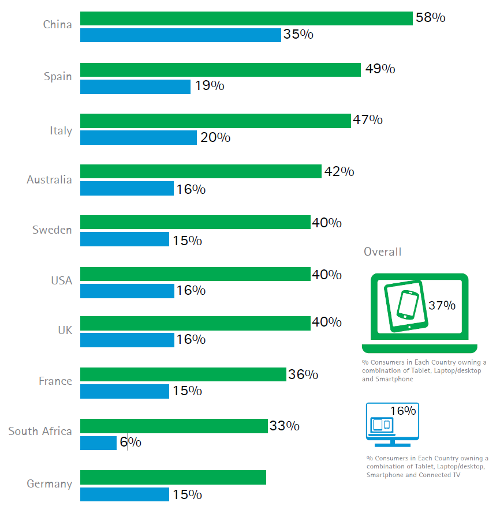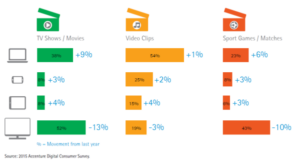Last week, Accenture, the consultancy, published its fifth annual multinational survey on digital content consumption and it had some interesting conclusions.

Up to now, short form content has been the main type of viewing on mobile devices – YouTube reports that 50% of its views are on mobile devices. However, the survey revealed a dramatic drop in TV viewing of long form video content of 13% (11% in the US) in the last year. Even sports viewing, the key Pay TV driver, dropped by 10% on TVs and moved to computers, especially.
Although the trend was strongest in 14-17 year olds, the trend applied to all ages. This group watches only 29% of its TV shows and movies on TV sets, 33% down on last year. 18-34 year olds watch 46%, while the 35-54 group watches 58% and the 55+ group 64%. Just as significantly, 87% of consumers are using other devices while watching TV.
The survey showed the extent to which consumers are equipped with a wide range of devices for viewing content. The firm said that 58% of Chinese consumers have a combination of tablet, computer and smartphone, while 35% have connected TV as well.
The survey also confirmed the well understood switch to “cord cutting” and also highlighted that consumers (89% of whom watch TV shows, movies or sport over the internet at least some times) dislike the interruption of programmes by advertising, buffering delays and bad quality video and audio during playback. Quality is a particular problem in the Middle East and Latin America, but is also important in Europe and the US (for 42% and 32% of viewers, respectively). Poor quality will drive broadband and mobile provider changes.
Finally, consumers do trust their broadcast providers and cable companies to deliver internet content, for now at least.
So what is the conclusion? Accenture doesn’t see the end of traditional TV, but points out that traditional providers need to react quickly to these changes. If they don’t, new TV entrants such as Netflix, Amazon and YouTube, that already understand the need to support multiple screens with good analytics to provide an enhanced experience, will take a lot more of the market. The firm points out that these firms have been joined recently by HBO with HBO Now, CBS with Live TV and Dish with Sling TV. Sony has joined in with PlayStation Vue and it expects Apple to start a service later this year. The pace of change is also accelerating.
A couple of years ago, I went to a good panel session at IBC on this topic. A number of “traditional” broadcast channel owners made a good case for why many or most consumers will continue to want a curated and quality/content-controlled experience, comparing a TV channel to a newspaper. At the time, I thought the argument was a powerful one for the continuation of the traditional TV channel concept. Now, I’m not so sure.
Anayst Comment
I’m a geek, and was one of the first to buy a Tivo PVR when they first became available (I remember trying to explain to the retail sales assistant that I bought it from what it was!). For many years, almost the only live TV I have watched has been sport, or the occasional news programme.
However, I recently realised that in the last couple of years, my wife and I, like many others, have switched much more to “binge viewing”, using downloadable “boxed sets” as well as packaged media to watch multiple episodes of HBO or US drama or comedy series or Scandinavian dramas as well as local UK content. As we’re in the older age group, have similar tastes in comedy and drama (and even in soccer!), and have an “empty nest”, we use the main TV. If our children were still at home, that might be different.
Because we can get some (and, crucially, just enough) of this content through our satellite broadcast provider (Sky), we haven’t bothered to sign up with Netflix or Amazon, but it wouldn’t make much difference to the experience if we did, I don’t think.
As I’m fond of saying, “Anecdotes are not the same as market research”, but the Accenture research does suggest that my experience is increasingly typical. Next week, the TV Connect event will take place in London and I’m planning to visit to discuss these topics further. – Bob Raikes

